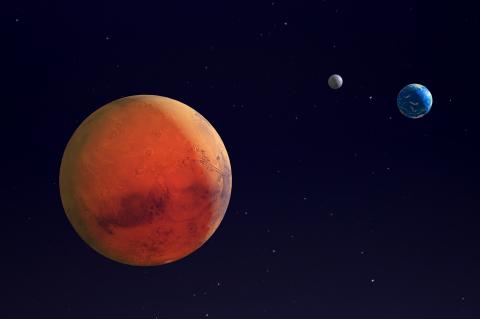OU awarded £1 million to explore Mars and the Moon

Researchers in the OU's Space Science priority research area have been awarded five grants totalling more than £1 million by the UK Space Agency through its “Aurora” funding programme. These grants make up about a third of the total fund awarded, demonstrating the OU’s position as a leader in planetary science.
The grants, awarded to members of the School of Physical Sciences, provide funding for three new postdoctoral researchers as well as support for four members of academic staff and other research staff.
Understanding the Martian environment
Two of the grants focus on data from the European Space Agency’s (ESA) new ExoMars Trace Gas Orbiter spacecraft (TGO). Dr Stephen Lewis was awarded
£334,000 for a project aiming to understand the behaviour and transport of water in the Martian atmosphere by combining new measurements from TGO’s “NOMAD” instrument with atmospheric circulation models.
Dr Matthew Balme was awarded £56,000 to support his role as a TGO Guest Investigator, in which he will use TGO’s new colour imager to detect and track dust devils (small whirlwinds) on the Martian surface.
In addition to his TGO award, Dr Matthew Balme was funded £293,000 to continue geological studies of potential landing sites for the ESA ExoMars 2020 Rover. The project team will perform mapping of the two candidate sites to determine their geological history.
A fourth grant supports UK involvement in the NASA InSight mission, a Mars lander that will touch down in late 2018. Dr Axel Hagermann was awarded £365,000 for his work on the heat flow sensor on board InSight. The project involves modelling and laboratory studies that will allow a better understanding of the data that will be returned by the probe.
Exploring resources on the Moon
Finally, Dr Mahesh Anand has been awarded £107,000 to perform new studies of soil on the Moon to determine whether useful resources can be extracted from it. This data will support the development of instruments for a proposed joint Russia-ESA lunar lander to be launched in 2021.
Dr Stephen Lewis commented: “The range of these projects from subsurface to surface to atmosphere, and combining new observations with the latest modelling techniques, illustrates the strength of combining a range of OU expertise for solving complex planetary problems.”
Dr Matthew Balme added: “The OU has one of the biggest planetary science research groups in the UK, and we work on many high-profile missions, so this funding really helps us get the very best science results from our involvement.”
The research projects will run until 2020.
Find out more details on the OU's planetary sciences research.
Read more about OU Space Science research.
More details on the curriculum can be found at:
Contact our news team
For all out of hours enquiries, please telephone +44 (0)7901 515891
Contact detailsNews & articles

OU research model drives literacy transformation across São Paulo
A major state-wide literacy programme in Brazil is demonstrating how Open University research is informing public policy at scale, following its high profile presentation at BETT London 2026 by São Paulo’s Secretary of Education, Renato Feder.